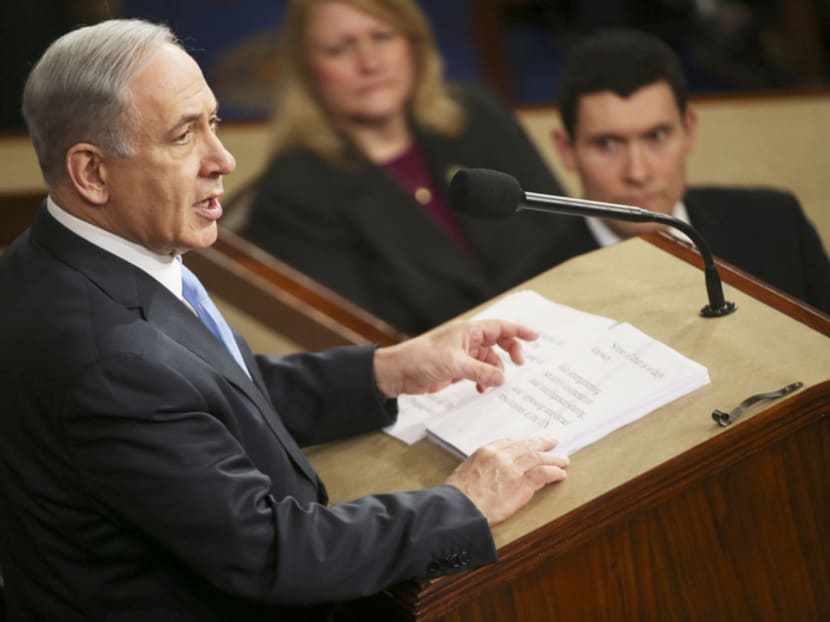Iran N-deal will spark Mideast arms race, Netanyahu tells US Congress
SINGAPORE — Israeli Prime Minister Benjamin Netanyahu said in a controversial speech before a joint session of the United States Congress in Washington that any deal with Iran that does not eliminate its nuclear programme would “spark a nuclear arms race in the most dangerous part of the planet”.

Israeli Prime Minister Benjamin Netanyahu addressing a joint session of the US Congress in the Capitol Building in Washington yesterday. Photo: The New York Times
SINGAPORE — Israeli Prime Minister Benjamin Netanyahu said in a controversial speech before a joint session of the United States Congress in Washington that any deal with Iran that does not eliminate its nuclear programme would “spark a nuclear arms race in the most dangerous part of the planet”.
“The Iranian supreme leader Ali Khamenei tweets that Israel must be destroyed,” said Mr Netanyahu, adding: “Iran’s regime is not merely a Jewish problem, just as the Nazi regime was not just a Jewish problem ... Iran threatens the peace of the entire world.”
Mr Netanyahu began his speech by saying he wished it had not become politicised and that he meant no disrespect to US President Barack Obama.
Almost a quarter of the US’ Democratic lawmakers boycotted the speech — which has put unprecedented stress on the two leaders’ already strained ties — as Mr Netanyahu escalated his campaign against Mr Obama’s Iran diplomacy.
The absence of so many lawmakers could be politically embarrassing at home for Mr Netanyahu two weeks before an Israeli general election. Many Israelis are wary of estrangement from an American ally that provides their country with wide-ranging military and diplomatic support.
The White House was wary of his use of the forum to lay bare the closed-door negotiations, which are designed to curb Iran’s nuclear drive.
But Israeli Defence Minister Moshe Ya’alon pushed back against the notion that Mr Netanyahu might divulge sensitive material, telling Israel’s Army Radio: “The Prime Minister will not expose new information from the contact between the world powers and Iran.”
In his speech, Mr Netanyahu said: “The people of Iran are very talented people, but in 1979 they were hijacked by religious zealots.”
He added that the zealots then drafted a new Constitution that included things such as supporting global jihad, saying: “America’s founding document promises life, liberty and the pursuit of happiness, while Iran’s promises death and tyranny.”
Mr Netanyahu said certain elements of any deal are now a matter of public record and there was no need for “intelligence agencies or secret information to know this”.
If no changes were made, he said, the deal would include a concession that “would leave Iran with a vast nuclear infrastructure and not a single nuclear facility would be demolished ... the programme would be left largely intact and the breakout time to build a bomb would be about a year, according to the US, and less than that, according to Israel.”
He also said certain restrictions would be imposed that would be monitored by international inspectors, but that presented problems, as “inspectors document violations, they don’t stop them ... North Korea turned off the cameras, kicked out the inspectors and we know now within five years, they could have 50 to 100 nuclear weapons”.
“This deal doesn’t block Iran’s path to the bomb, it paves the path to the bomb,” Mr Netanyahu added.
If the deal was made and sanctions against Iran lifted, he said the Iranian regime would not change for the better, but its “voracious appetite for violence” would grow.
“How many more countries will Iran devour when sanctions are lifted?” he asked.
If Iranians do manage to eventually develop a weapon, its neighbours in the Middle East will race to get the bomb, which will spark a nuclear arms race in the most dangerous part of the planet. The Middle East will be crisscrossed by nuclear tripwires,” he said.
Mr Netanyahu said the world had come to two paths and it was time to choose. One led to war, the other to peace, he said.
“You don’t have to be an expert on Robert Frost to know that the difficult path is usually the one less travelled, but it will make all the difference to the Middle East, to my country and to the peace in the world that we all desire.”






